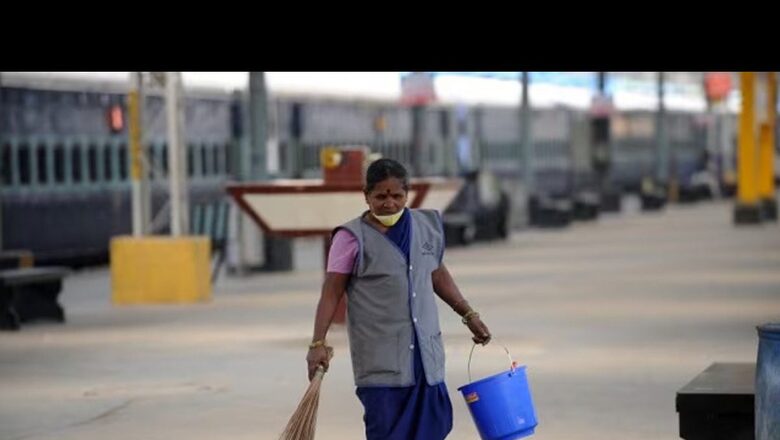
views
Despite the success of the Swachh Bharat Mission, sanitation work continues to be one of the most undervalued services in our society. To put it in context, without the work of cleaning and maintaining our toilets and sewers, disposing of animal and human waste, garbage and sewage, our cities, towns and villages would turn into unlivable spaces where diseases run rampant.
Think about it, would you like to walk past piles of garbage on your way to work, or work in an office where the whole office smells like a urinal because the toilets aren’t cleaned? Would you be able to concentrate on work if you had to ‘hold it’ all day because the toilets are disgusting? What if, when you came home (walking past a mountain of garbage piled outside your building’s gate), you were told that the sewage had backed up, and was now flowing out of your toilet?
Isn’t it ironic that the work of cleaning is considered ‘dirty work’?
In India, sanitation work has been marked by stigma for generations. This stigma stems from the fact that such work is considered menial and unskilled, leading to the perception that those engaged in it are somehow ‘less than’ others. Historically, only people from the lowest castes, such as the Valmiki community, performed these tasks. The caste system solidified the identity of these communities with the work they performed, causing a whole community of people to be thought of as ‘dirty’. Even today, despite legal bans and constitutional protections, many lower caste people continue to face discrimination and violence because of their caste identity and occupation.
Among the lower caste sanitation workers, women face additional challenges due to gender inequality and patriarchy. They are often paid less than men, have less access to education, health care and social security, and face higher risks of harassment, abuse and exploitation. They also have to balance their domestic responsibilities with their work, which often involves long hours, heavy physical labour and exposure to hazardous substances.
Despite these hardships, women sanitation workers have proved that they are not passive victims. They are resilient agents of change who are challenging the societal perceptions and norms that devalue their work and dignity. They are also contributing to community development by improving public health, hygiene and environmental sustainability.
Breaking the Chains of Stigma
Women sanitation workers are breaking the chains of stigma, one act of courage at a time. Thankfully, they are not alone in this fight – a number of NGOs and grassroots organisations are helping empower these women through education, training, legal aid and creating other support systems they need. After all, lasting change comes from within, and these women are proof of it.
Challenging Gender Norms
Historically, sanitation work has been a male-dominated field. That didn’t stop Venkatalakshmi, who hails from Narsapur, Andhra Pradesh. Despite her family and societal objections, she took the helm of her desludging business, teaching herself the engineering and mechanical aspects of desludging trucks. With remarkable courage, she secured loans, hired drivers, and painted the trucks to make them appealing. Today, she is a successful entrepreneur who inspires other women.
Advocating for Dignity
Because the work is considered ‘dirty’, and by association the workers too, sanitation workers often work in hazardous and dehumanising conditions. Usha Chaumar, who today helms the Sulabh International Social Service Organisation, started her journey as a 7 year old toilet cleaner in Alwar, Rajasthan. With the support of Sulabh International, Usha championed change, inspiring and enabling thousands of other sanitation workers to demand better working conditions and better pay.
Through her work, Usha has lifted many women out of poverty and she herself is a shining example of the life that is possible for women like her. Today, her son is pursuing a postgraduate degree, something she knows he wouldn’t have had access to, without the choices she made.
Economic Empowerment
Women often go into sanitation work because they have no other prospects because of their lack of education and opportunity. This creates much room for exploitation. But education can change that.
Maya Sable spent 12 years toiling in the unorganised sector, doing all she could to keep her family clothed, fed and housed. She knew something needed to change, and enrolled herself with the Harpic World Toilet College. Emerging as a graduate of their training program, she secured a job in housekeeping. Now, she earns more than double her previous salary and enjoys access to essential benefits like PPE kits, Provident Fund, ESI, and insurance. She is finally able to look past mere survival, and is working to create a better future for herself and her children.
Changing the Narrative
Changing societal perceptions is an uphill battle, but it’s a battle worth fighting. There are two aspects that contribute greatly – training for the sanitation workers, and telling their stories to a larger audience.
Harpic is doing both. As India’s leading brand in the lavatory care segment, Harpic has a deep and nuanced understanding of the challenges these women face. Harpic channelled this understanding into the creation of the Harpic World Toilet College (HWTC) in 2016.
HWTC was established with the stated objective of improving the quality of life of sanitation workers through their rehabilitation by linking them with dignified livelihood options. Workers trained by the college are provided placement with various organisations. Following the successful proof of concept in Rishikesh, HWTCs have opened in Maharashtra, Aurangabad, in partnership with Harpic, Jagran Pehel and Maharashtra Government.
Harpic wanted to also spark a larger conversation and bring attention to these extraordinary women and their struggles. To accomplish this, Harpic joined hands with News18 in Mission Swachhta aur Paani, a movement that champions the cause of inclusive sanitation, equality for all genders, abilities, castes and classes and the strong belief that clean toilets are a shared responsibility.
For 3 years now, Mission Swachhta aur Paani has brought together the right stakeholders on a common platform, so that issues of importance can be discussed, and solutions found. There are many ways all of us can help create a more fair and just system of employment for these people.
Mission Swachhta aur Paani has also used News18’s reach to bring these powerful stories to you, the reader. What you think and feel about these issues matters, because society is shaped by how we all think and feel, and the conversations we have.
Join us here, to learn and have the important conversations we need to, to usher in a just, equitable, compassionate, Swachh and Swasth Bharat.
















Comments
0 comment